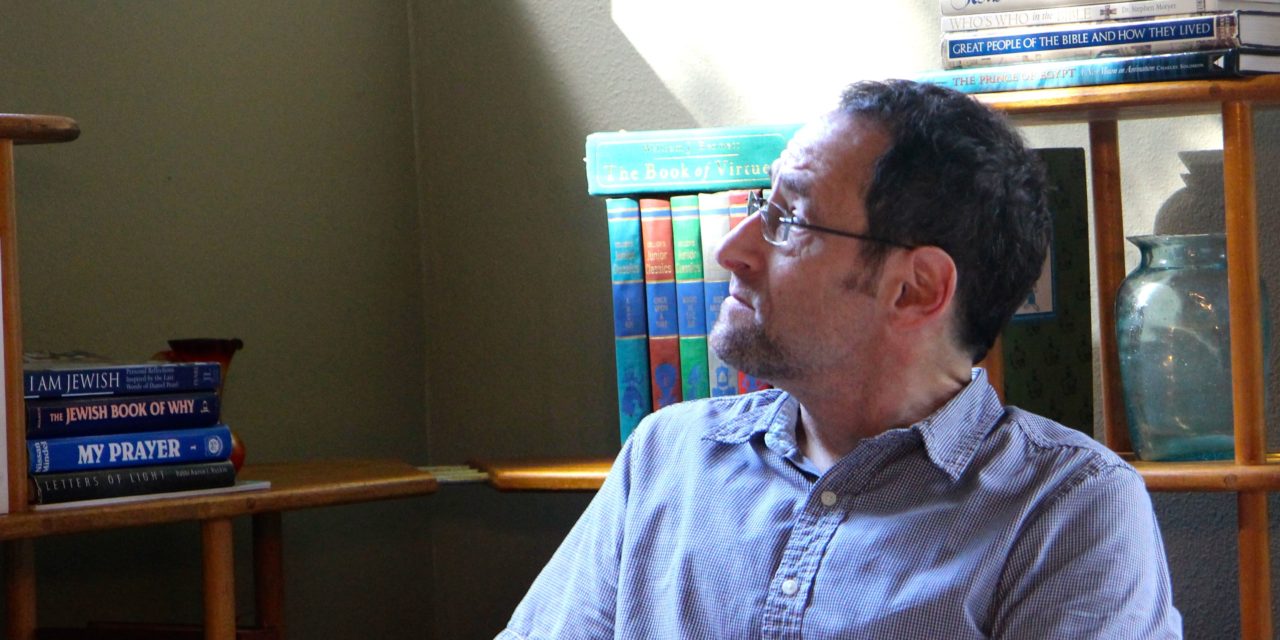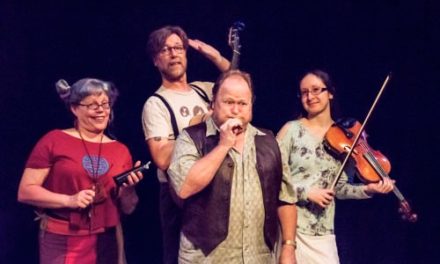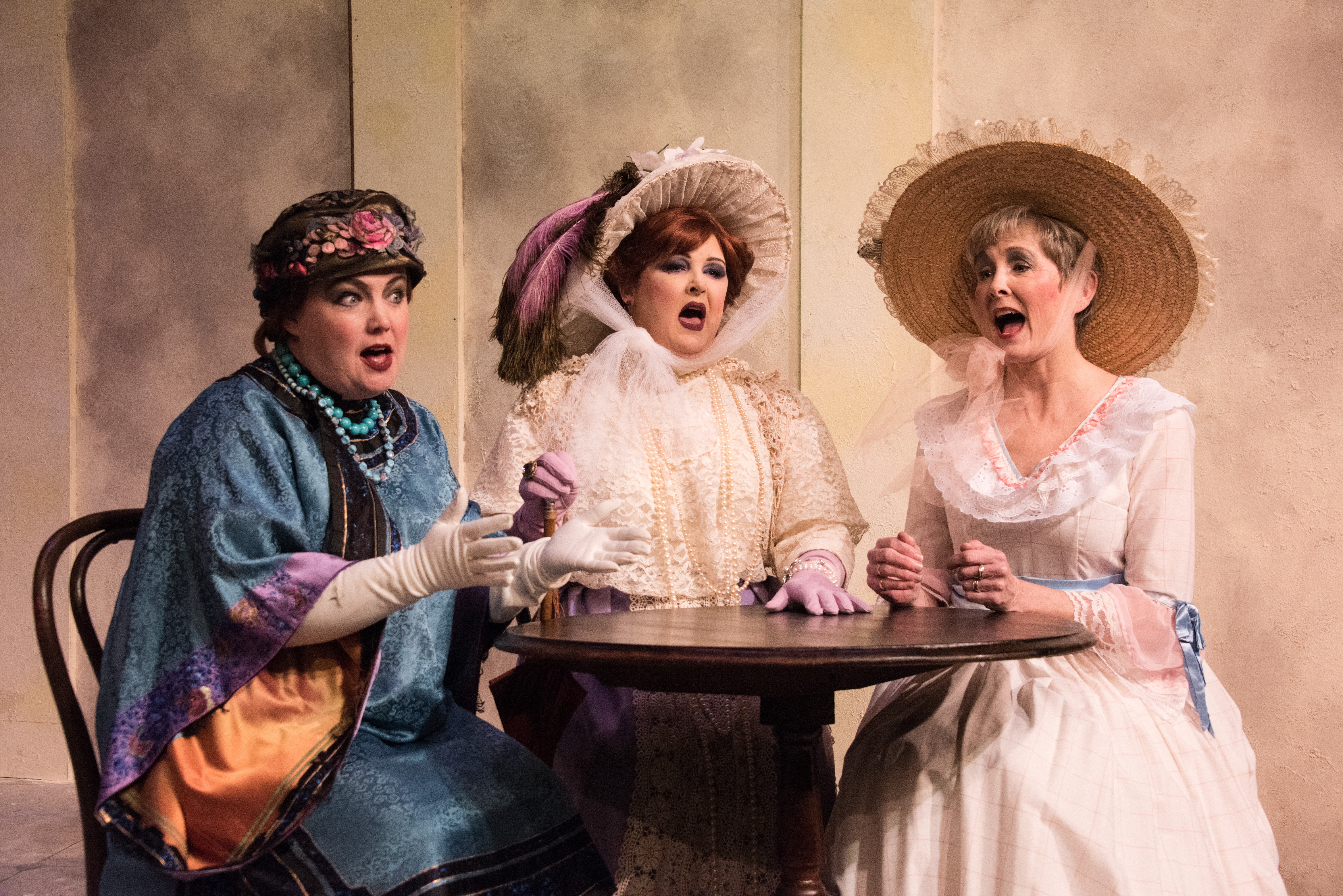Above: Actor Paul Rhoden; photo by Randi Bjornstad
Note: This profile first appeared in the Radio Redux newsletter in September 2019, courtesy of The Eugene Scene
By Randi Bjornstad
For some unknown reason, theatrical superstition holds that it’s bad luck to wish a theatrical performer good luck, so in English-speaking countries, it’s customary to exhort actors to “break a leg” before they take to the stage.
For Eugene actor Paul Rhoden, who made his debut on the Radio Redux stage in its 2019-20 season opener, 20,000 Leagues Under the Sea, that exhortation not so long ago became unfortunate reality.
It happened earlier that season during a rehearsal at The Very Little Theatre for The Game’s Afoot, in which Rhoden had been cast in a leading role.
“In one scene, I had to take a big leap onstage, and it was early on in the process, so everything hadn’t been finished on the set,” Rhoden recalled. “I took my big leap, fell, and tore the ACL (ligament) in my right knee. I had to have surgery.”
That was the end of his playing Felix, a role he’d been really excited to perform. With barely two weeks to go before opening, fellow actor Tom Wilson had to step in.
“Tom did a great job — it was amazing how quickly he was able to put the role together,” Rhoden said. “I was really disappointed, of course, because I had felt I had something a little special that I could bring to the part of Felix. And I was developing a really nice onstage backstory with the woman who was playing Felix’s wife. We had created a whole little world to help us give more depth to our roles.”
It’s a technique Rhoden often employs in bringing more reality to roles he inhabits.
“Sometimes I just do it and keep it to myself, but sometimes when I’m playing opposite another character, we do it together, talking about who these people are, how they relate to each other, and what they really want from their life in the play. It is a way to find subtle things that make the characters more genuine people.”
Not that Rhoden wants to be a star, far from it.
“One of my strengths is recognizing my limitations,” he quipped. “I don’t sing, for instance. And I find that I’m much more comfortable in smaller roles that can add color or atmosphere to the play. That’s more my comfort zone.”
Radio Redux matches that attitude perfectly — an ensemble of actors reading classic radio show scripts to entertain the live “studio audience” — which is why Rhoden really wanted to become part of its cast.
“I love radio, especially radio comedy — I grew up listening to Jack Benny, Jimmy Durante, Jackie Gleason, all the great radio performers,” he said. “I love the conceit of it, the essence of the radio studio with the sound effects, the actors at the microphones, the theater of the mind aspect. And Fred Crafts has really carved out a niche for this type of performance. I thought many times, ‘I wish I could get up there and do this, too.’ There’s a kind of magic in this kind of theater.”
Rhoden asked around among his theater friends about the way to join Radio Redux, “and everyone said, ‘Fred has to ask you,’ but I took a chance and asked him, and lo and behold, he emailed me back and said he was looking to hear some different voices — high, low, accents, dialects — to get a sense of whether they could work with Radio Redux.”
Fortunately, one of Rhoden’s talents “has always been the ability to do impressions,” he said. “I learned how to do Alfred Hitchcock, Richard Nixon — I stole Rich Little’s impersonations of Nixon and Jack Benny — and I learned to do an English accent by listening to it. As a kid, I would crack my friends up doing the science teacher. I never did impressions to belittle anyone, just to try to capture their essence.”
Even so, Rhoden expected “a very steep learning curve” with Radio Redux, finding out how to fit into the ensemble and how he would sound as a radio performer, “learning how to play off other characters and figuring out this new way of acting.”
Rhoden first came to Eugene in 1991, then left to return to southern California — he had grown up in Los Angeles and the San Fernando Valley — before returning to Oregon, first to Portland and then back to Eugene in 2008.
He was a “social studies teacher by trade” and also did several stints in special education programs, including the Skipworth Juvenile Detention Center, now known as Lane County Youth Services. He currently provides care for an elderly relative.
But show business of various sorts was a constant in his life, starting with growing up with a lawyer father and a scriptwriter mother, who had three sons and a daughter before divorcing when Rhoden was 6 years old. But his father remained an important part of his children’s lives.
During her homemaking years, his mother took writing classes at night and eventually became a sitcom scriptwriter for shows that included Three’s Company, One Day at a Time, Alf, and Golden Girls. Her second husband was a game show producer and host, working on programs such as Hollywood Squares, Celebrity Sweepstakes, and Let’s Make a Deal.
“My dad, Harold Rhoden — he always told people, ‘Please call me Hal,’ — was a highly reputable attorney with very high-profile clients,” Rhoden said. “He did a lot of Hollywood celebrity divorces — one of Johnny Carson’s wives, and Bianca Jagger and Morgan Fairchild.”
He also represented Soraya Khashoggi, the wife of Saudi billionaire Adnan Khashoggi in that couple’s divorce , and “That was the case that put me through college,” Rhoden said. “His last case was suing the Rock Hudson estate on behalf of his live-in lover, because Rock Hudson didn’t tell the guy that he had AIDS. My dad argued a ‘duty to warn’ concept, which was new at the time. Now it’s taught in law schools.”
Harold Rhoden died in June 1989 while piloting a small plane carrying him, his second wife, their 13-year-old daughter, and Paul Rhoden’s paternal grandmother.
“It was not pilot error — my dad had been a tailgunner in World War II and their B24 Liberator was shot down in 1944, and he spent the rest of the war as a POW in Germany,” he said. “That gave him an attitude of living on borrowed time, and it made him rock hard and determined to live with gusto. After the war, he became a pilot, and we flew all over the southwestern U.S. when I was young.”
His father was not a risk-taker but was scrupulously conscientious about checking every aspect of his flying machines, Rhoden said.
“He had bought a French plane, a Socata Trinidad Spéciale, and it was giving him some problems, so they gave him a new airplane with updates,” he recalled. “He was in Sacramento for flight training, and my 13-year-old half-sister was also taking lessons so that she could take over if anything ever happened to him during a flight.”
On the flight back to Los Angeles, the engine stopped 10 minutes before the end of the trip, over the community of Santa Clarita, and Harold Rhoden had to find a place to land.
“At first, he decided to land on the freeway, but there was a car fire, and traffic was completely backed up,” Paul Rhoden said. “He veered left toward a ravine, but when he came down he clipped a power line and crashed. Three generations of women in one family died. I was supposed to have dinner with them that night. I had just completed my student teaching that very day. I was so excited about starting teaching.”
Rhoden’s own life spiraled downward for a couple of years after the deaths of his family members, until he decided to leave Los Angeles and its memories and relocate somewhere else.
“I thought about Alaska or New Mexico or Oregon, and I knew a girl who had gone to college in Eugene, so I came here and took to it — it had all the things I wanted to get away from in LA, like chaos and sprawl. Eugene was a good size, and you could actually function here.”
Soon after his arrival in 1991, Rhoden happened to see a notice for a cold-reading audition at the Lord Leebrick Theatre — starting in a half-hour — so he went there, did the reading, got a callback, and was cast as a lead in an original play.
“It was about a group of people in a bar — their memories, motivations, and interactions,” he recalled. “I discovered a creative thing, a collaborative thing, and I got really excited about being in theater. I found it was something I could do — I wasn’t great, but I thought I could contribute something.”
When he returned to Eugene the second time, in 2008, Rhoden immediately looked for theater opportunities, and actor/director Chris Pinto “was the first person I saw,” he recalled.
“When I left, I didn’t realize how invested I had become in theater, and when I came back I felt so welcomed. When I saw Chris, he said, ‘You — I’m going to get you into a play, and he did. It was Funny Money at The Very Little Theatre. I immediately reconnected and met so many wonderful people — it was like having an instant family.”
He’s been doing it ever since, with a long list of acting credits that include roles in productions at Actors Cabaret of Eugene, Oregon Contemporary Theater, The Very Little Theatre, and Radio Redux.








